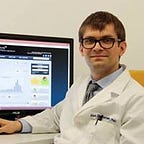The Emerging Field of Deep Biomarkers of Aging — Why did we sell Deep Longevity to Regent Pacific?
As a CEO of Deep Longevity, which has just been acquired by Regent Pacific (HKEX: 0575) I now have to bee very careful about what I say about the company. I will not be able to provide any financial guidance, investment advice, or talk about anything that is not public knowledge already.
This announcement came on the second day of the largest conference on aging research and drug discovery in recorded history — 7th Aging Research and Drug Discovery (7th ARDD), and made quite a splash in the longevity biotechnology circles. So many of my friends, collaborators, and employees are asking me why did we decide to sell so quickly after raising our round A from some of the most sophisticated longevity investors in the world?
Well, the short answer is simple — to create the first publicly-traded longevity biotechnology conglomerate which uses a broad range of aging and longevity biomarkers dubbed “deep aging clocks” at its very core and reaches into the many industries where these clocks can be applied.
We want to create a fully-integrated ecosystem that would include the top academic institutions, healthcare providers, elite preventative care, and longevity medicine providers like Human Longevity Inc (and I do recommend signing up for their HealthNucleus program), equipment vendors, insurance companies, and biotechnology and pharmaceutical companies.
In 2013 by Steve Horvath out of UCLA published a very important paper on methylation biomarkers of aging as a single author and opened the door for the development of a broad range of aging clocks. As we all know, given a large amount of data, deep learning systems can outperform humans in many tasks and in 2015–2016 my group was probably the first one to start building aging clocks using AI. And not only on methylation data but many data types ranging from blood tests, gene and protein expression to microbiome, and even some data types that you never thought about. I do not want to talk about it yet because we are working on a publication.
These aging clocks can be used to discover new longevity interventions, test the efficacy of the different interventions, predict mortality, predict disease, improve clinical trial design, personalize vaccines, and the list goes on and on. But I think that nowadays you should not start a project in longevity if you are not using an aging clock.
In 2019 we created a fully-owned subsidiary of Insilico Medicine called Deep Longevity which took the results of our work on biomarkers of aging and longevity and turned it into a business.
Now, this business will serve as a core and a central engine of a public company focusing on longevity.
Yes, I will need to step down as a CEO of the company and into a super cool role (I think we are setting a precedent for any public company) of a Chief Longevity Officer (CLO). But Jamie Gibson, a long-term colleague of Jim Mellon, who made many successful bets in biotechnology is much better for the role of a CEO in a public company where every word needs to be carefully weighed. One of the most impressive scientists in biotechnology, Dr. Wei-Wu He will join as the director. There are many other top players involved and I hope that the company will be able to announce the SAB one day.
16 years ago I decided to dedicate the rest of my life to helping everyone else live longer with an option for continuous improvement instead of the grim decline and death. And those who know me know that I am working very hard every day as a scientist, inventor, entrepreneur, investor, and populist. I do not have a family, and most of my friends work with me or in collaborating or even competing organizations. I do not find any hobby to be more interesting than extending human life and improving performance. So nothing can make me happier than today’s announcement and the actions that will follow.
Oh, and why Hong Kong?
Well, I will stay out of current politics. South China Morning Post did a much better job telling this story. To solve aging and disease we need to work together globally and avoid any nationalist, racist, or sexist thoughts. The clocks are ticking for all of us and we need to focus on bringing together the best science from all over the world to go after aging and disease.
And finally, I must thank my teams at Insilico and at Deep Longevity who are the real-life superheroes and are constantly proving that concepts that were previously considered to be difficult or impossible, are actually doable. These are some of the smartest, most dedicated, and altruistic people on this planet and I am deeply honored to work with them even though I am usually very demanding, tough, and sometimes rude and grumpy. Sorry guys, but what is the point in living if we do not work our butts off to conquer aging and disease?
